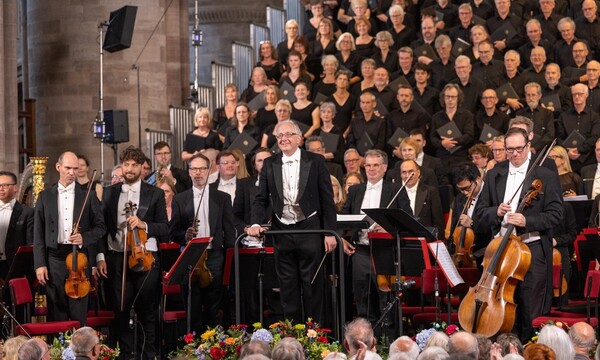News Story

The festival has been privileged to enjoy royal patronage for almost two centuries, and is delighted that HRH The former Prince of Wales has visited in recent years in his role as Festival President.

HRH The Former Prince of Wales attends Medelssohn's Elijah at Gloucester 2016 - Credit Ash Mills
We would also like to congratulate our honourary Patron Roderick Williams, who will be one of the featured soloists at the coronation of King Charles III. In addition to his performance as a soloist, Roderick is also one of ten British composers who have been commissioned to write music for the service. You can listen to him perform at the Three Choirs Festival in The Holy City and The Faerie Bride, and hear the ORA Singers perform his piece Ave Verum Corpus Re-imagined, which pays homage to Byrd’s Renaissance masterpiece.
Simon Carpenter, the festival’s volunteer archivist, has put together the history of the Three Choirs Festival’s Coronation connections.
Some Festival Coronation Connections

1953: Walton and the BBC
The most recent Coronation was of course Elizabeth II on June 2nd in 1953. The Festival that year was in Gloucester, and it marked the occasion by including two new works commissioned from William Walton for the Coronation in the programme. These were the Coronation Te Deum, which was included in the opening service, and the march Orb and Sceptre which was originally slotted into the Wednesday evening concert given by the London Symphony Orchestra and the Festival Chorus. Halfway through that concert the hymn Dear Lord and Father of Mankind to the tune by Parry was also to have been sung, and the congregation was asked to join in. However, at some point the BBC stepped in and chose to broadcast the Wednesday concert live from the cathedral, and the final programme as given in Radio Times looked somewhat different. Out went Finlandia and the hymn, and in came a repeat performance of the Coronation Te Deum. Shrewd moves by the BBC and/or that year’s Festival Director Herbert Sumsion.

Boyce, Handel and Zadok the Priest
Another interesting Coronation from a Three Choirs perspective is that of George III on September 22nd in 1761. Almost all the music was composed by William Boyce, one of the Chapel Royal organists and Master of the King’s Music. The exception being Zadok the Priest which Boyce declined to set, saying "it cannot be more properly set than it has already been by Mr. Handel.” Handel had set it for the Coronation of King George II in 1727. Earlier in his career Boyce had been a regular Three Choirs conductor, first appearing as such for the Worcester Festival of 1737. Frustratingly, he must have composed a lot of music for the Festival, but the only definite piece that can now be identified as such is his ‘Worcester’ Symphony (No. 8 in D minor). The Three Choirs Festival in the year following the Coronation, 1762 (Hereford), according to the press notice, included Handel’s ‘Celebrated Coronation Anthem’ (performed on two separate occasions), undoubtedly Zadok the Priest, and a lot more of Handel’s music beside.

Parry and I was Glad
Alongside Zadok the Priest, arguably the most well-known Coronation anthem is Sir Hubert Parry’s I was glad. Taken from Psalm 122, the anthem has been sung at the entrance of the monarch at every Coronation since Charles I in 1626. Parry's version was composed for the Coronation of Edward VII in 1902 and revised in 1911 for that of George V when the familiar introduction was added. At the 1902 Coronation, Sir Frederick Bridge, the director of music, misjudged the timing and had finished the anthem before the King had arrived, having to repeat it when the right moment came.
Gloucester-born Parry is well known for his associations with the Festival, and his music has regularly featured in Festival programmes since his first premiere, Intermezzo Religioso in 1868. When the Gloucester Committee approached Parry for a new work for the 1904 Festival, Jaeger, of Novello’s the publishers wrote to the composer, ‘I feel almost inclined to commiserate with you, because those kind Gloucester people want another new work. Let them do the splendid Te Deum and allow you to devote your time to clear up arrears … a little! Why not? Why won’t they leave you alone for once and give you rest?’
More Stories...

Geraint Bowen, Artistic Director of the Hereford Three Choirs Festival, announces his retirement
19 September 2025Geraint Bowen has announced his retirement in 2026, concluding his tenure as Organist and Director of Music at Hereford Cathedral and Artistic Director of the Hereford Three Choirs Festival.More info
Three Choirs Festival attracts over 2,000 visitors per day across 8 days
5 August 2025The 297th festival hosted 71 events in venues throughout HerefordshireMore info
Their Royal Highnesses The Duke and Duchess of Gloucester attend the Three Choirs Festival 2025
30 July 2025The Three Choirs Festival was honoured to welcome Their Royal Highnesses The Duke and Duchess of Gloucester to Hereford on Tuesday 29 July 2025.More info




